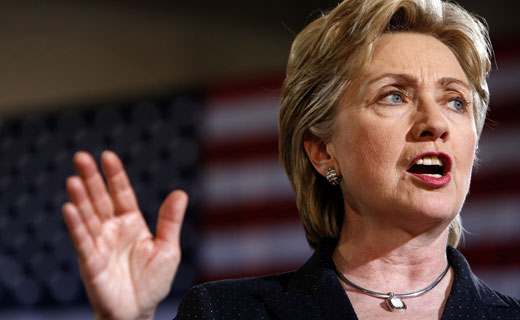US presses Syria to move away from ally Iran
Lachlan Carmichael
WASHINGTON, Lachlan Carmichael - On the eve of a visit by Iranian President Mahmoud Ahmadinejad to Damascus, the Obama administration said Wednesday it is pressing Syria to move away from ally Iran and stop arming Hezbollah.
US Secretary of State Hillary Clinton said it is also urging Syria to stop interfering in Lebanon, cooperate in Iraq and resume peace talks with Israel when she disclosed the administration's price for deeper engagement with Syria.

US Secretary of State Hillary Clinton (AFP/Saul Loeb)
Syria earlier announced that Ahmadinejad will visit Damascus on Thursday for talks with Syrian counterpart Bashar al-Assad, whose government says it wants to help Iran and the West engage in a "constructive" dialogue over the program.
During a budget hearing, the chief US diplomat said she agreed with a senator that "there is a slight opening (with Syria) to build on...but there are a lot of issues between our government and the Syrian government."
She said William Burns, the undersecretary for political affairs and third-ranking US diplomat, "had very intense, substantive talks in Damascus" when he visited there last week.
"And we've laid out for the Syrians the need for greater cooperation with respect to Iraq, the end to interference in Lebanon and the... provision of weapons to Hezbollah, a resumption of the Israeli-Syrian track...," she said.
Clinton said Washington also is asking Syria to "generally to begin to move away from the relationship with Iran, which is so deeply troubling to the region as well as to the United States."
The United States accuses Syria and Iran of supporting militant groups in the region, including the Lebanese political and guerrilla movement Hezbollah as well as the Palestinian radical group Hamas.
Iran and Syria are the main foreign backers of the Shiite militant group Hezbollah but both deny that they provide anything other than moral support.
Washington also accuses Syria of turning a blind eye to militants crossing its border into Iraq.
Clinton promised to study Senator Arlen Specter's proposal to invite Syrian leader Assad and Israeli Prime Minister Benjamin Netanyahu to the White House in a bid to revive talks suspended after Israel's 2008 armed incursion of Gaza.
But she expressed doubt over whether all the parties would agree.
President Barack Obama's administration has pursued a year-long campaign to engage Syria, a former US foe, and energize its thwarted push for a broad Arab-Israeli peace, particularly between Israel and the Palestinians.
Obama last week announced that Robert Ford will be the first US ambassador to Damascus since Washington recalled its envoy after Lebanon's former prime minister Rafiq Hariri was killed in February 2005 in a bombing blamed on Syria.
Analysts say engagement is more likely to produce modest benefits -- like better intelligence cooperation and an improved climate for peace -- than peel Syria away from a strategic ally like Iran or achieve a peace breakthrough.
However, analyst Aaron David Miller, who was a Middle East advisor in previous US administrations, expected the appointment of the new US ambassador would "make the Iranians nervous" in the short run.
Defending Iran, Syrian Foreign Minister Walid Muallem said Saturday that "sanctions are not a solution" to Tehran's showdown with the West.
---------------------------------------------------------------------------